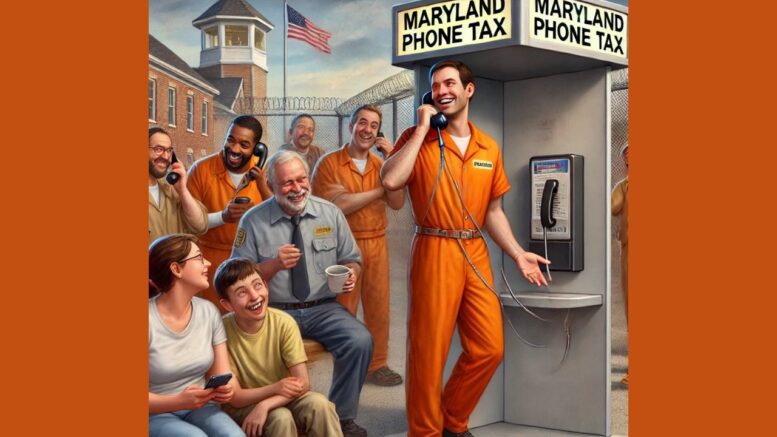There’s a special kind of tone-deaf lunacy that invariably emanates from the Maryland General Assembly during its annual 90-day tax-and-spend-a-thon.
Every year, we get a new batch of legislation that asks hardworking, overtaxed Marylanders to open their wallets just a little wider—for the “greater good,” of course.
And in 2025?
This year, Maryland’s far-left progressive caucus outdid themselves once more.
Meet Senate Bill 56 and its identical House twin, House Bill 401, better known as the “Let’s Make Prison Phone Calls Free Because We Can’t Think of a Better Way to Spend Taxpayer Money” Act.
The bills, sponsored by State Senator Jeff Waldstreicher and a crew of far-left House progressives, propose that Maryland taxpayers — you and me — should cover the costs of every single phone call made by incarcerated individuals in Maryland state prisons.
You read that correctly.
Maryland is experiencing budget constraints that impact essential services like roads, schools, and emergency services. Many families are struggling with the rising cost of living, so some state lawmakers prioritize legislation concerning the cost of prisoner phone calls.
And these out-of-touch politicians do not even have a plan to pay for their proposal.
Let’s walk through this madness step by step.
The Bills’ Background: Prisoner Phone Calls for Free!
Senator Waldstreicher of District 18 and his far-left Democratic House colleagues’ prisoner phone call legislation propose three significant changes to how Maryland’s prisoner phone system would work:
1) Taxpayers Must Cover All Inmate Phone Costs:
- Maryland inmates, as it stands, (or their families) pay for their own phone calls through commissary accounts, direct payments, or they call collect.
- Senate Bill 56/House Bill 401 would force Maryland’s correctional system to cover the costs of every inmate’s phone call;
- Translation: Progressive far-left Democrats want to force Maryland taxpayers to pick up the tab – millions of dollars in prisoner phone charges.
2) Eliminates Phone Profits from Commissary Funds:
- Phone call revenues previously helped fund Maryland state educational programs, vocational training, and other inmate welfare initiatives;
- However, those funds have not contributed to inmate programs since 2016, meaning Senate Bill 56/House Bill 401 would cut off a nonexistent revenue stream — a rare achievement in legislative pointlessness.
3) Creates an “Advisory Committee” to Study the Costs
- Nothing says, “We have no idea how to fund this,” like creating a bureaucratic think tank to figure out how bad the financial damage will be after the bill passes and is signed into law by Wes Moore, Maryland’s current governor.
Have a look at the bill’s language proposing yet another “Advisory Committee:”
In summary?
- Maryland prisoners would get free calls;
- We taxpayers foot the bill;
- Far-left self-congratulatory progressive politicians inauthentically pretend their prisoner phone call bill is “justice reform.”
How Much Will This Inmate Phone Call Bill Cost MD Taxpayers?
No one really knows for sure.
According to the Maryland Department of Legislative Services, this proposed legislation would cost at least $8 million annually — a conservative estimate.
Click here to read Senate Bill 56’s Fiscal and Policy Note.
Let’s do some math:
The cost of inmate phone services per year (based on recent averages):
- FY 2022: $6.3 million;
- FY 2023: $8.2 million;
- FY 2024: $9.3 million.
Trendline: Maryland prisoner phone costs are increasing every year.
Why?
Because Maryland inmates currently pay for their phone calls.
Now imagine what happens when calls are 100% free:
- Prisoner phone volume explodes — because why wouldn’t it? After all, Maryland taxpayers would pay the bill. Free phone calls!);
- The initiative would require additional infrastructure: phones, call monitoring systems and maintenance;
- Costs could skyrocket far beyond $8 million annually.
And which pot of state money will fund prisoner phone calls?
Maryland’s General Fund.
Here’s the Problem with Funding This Legislation from Maryland’s General Fund
Maryland’s general fund is the state’s primary budget source, covering essential public services that affect every Maryland resident.
What Maryland’s General Fund is supposed to pay for:
- Public schools & teacher salaries;
- Road repairs, bridges, and transit projects;
- Police, fire departments, and first responders;
- Public health programs and hospitals;
- Infrastructure and economic development.
What is Maryland’s General Fund NOT supposed to be?
A bottomless ATM for expensive progressive experiments with no cost controls.
If Maryland’s General Fund suddenly has to absorb at least $8 million per year to cover free phone calls for inmates, that means one of three things must happen:
1) Cuts to Core Services:
Since Maryland’s General Fund is not infinite, every dollar wasted on one thing is a dollar not spent on something else more important.
That could mean fewer resources for:
- Public school funding: (Good luck arguing free inmate calls are more important than textbooks.);
- Emergency services: (Does the state need fewer EMTs so that convicted murderers and rapists can chit-chat on the phone?);
- Fixing Maryland’s crumbling roads: (Gov. Larry Hogan proposed a serious traffic mitigation plan that Senator Waldstreicher and his fellow progressive Montgomery County state lawmakers essentially and senselessly blocked).
2. Higher Taxes Would Cover the Shortfall:
Raising taxes is another option if progressive Maryland lawmakers decide they can’t cut services to cover the cost of paying for prisoner phone calls.
How could Annapolis squeeze Maryland taxpayers to pay for this?
- Higher state income taxes;
- Increased property taxes;
- Additional service fees or surcharges.
Reminder: Maryland already has some of the highest taxes in the country.
And now, the same Maryland lawmakers who have bled taxpayers dry for years want us, the taxpayers, to subsidize phone calls for our guests of the government?
You might wonder what would happen if these same progressive state lawmakers took a poll on the streets of Salisbury, Gaithersburg, Westminster, Thurmont, Easton, Bel Air, Hagerstown, and Oakland to understand how Maryland taxpayers feel about paying for prisoner phone calls.
Do you think these lawmakers would share the poll results? You already know the answer to that goofy rhetorical question.
3. The Never-Ending Expansion of “Free” Programs
Here’s the dirty, filthy little secret of Annapolis’s progressive policymaking: Once something becomes “free,” the cost invariably grows.
- No far-left progressive state lawmaker would ever dare to roll back this policy once signed into law by Gov. Moore — even if costs spiral out of control.
- The demand for free inmate calls will skyrocket — inmates will naturally make more calls if they don’t have to pay.
- The cost of maintaining and expanding the program will only increase — leading to even more General Fund spending in the future.
Nothing is ever “free.”
You already know the answer to these questions:
- What happens when costs double or triple?
- Will Maryland taxpayers be asked to foot an even larger bill for an out-of-control prison phone budget?
No Limits, No Funding, No Common Sense: Taxpayer-Funded Prisoner Phone Calls
Let’s say you’re a Maryland taxpayer who doesn’t mind the occasional government handout. Maybe you even like the idea of keeping prisoners connected to their families.
But where’s the oversight?
- According to this legislation, there’s no cap on the number of calls a Maryland inmate can make;
- There’s no limit on call duration;
- There’s no funding mechanism, just an open-ended taxpayer subsidy.
What’s Jeff Waldstreicher and Jheanelle Wilkins’ plan for oversight and the fiscal management of their proposal?
An advisory committee.
Because Maryland taxpayers love it when Annapolis creates another unelected, unaccountable board to rubber-stamp bad ideas.
The Political Reality: Taxpayers Get Screwed (Again)
Let’s be clear: This legislative proposal is not about “prison reform.”
This legislation is about progressive lawmakers in safe blue districts who are once again pandering to their activist bases while completely ignoring the fiscal reality of the state.
Here’s what Marylanders should be asking:
- Why should Maryland taxpayers foot the bill for inmate phone calls while hardworking middle-class families struggle to pay their bills?
- Why is there no dedicated funding source to pay for this proposal?
- From where is the money coming?
- Which services will be cut to pay for this initiative?
- Why is there no cost containment?
- Shouldn’t there be a limit on how much the state is willing to pay?
This legislation isn’t a serious policy proposal; it’s virtue signaling of the worst kind.
If these progressive state lawmakers were serious about “pRiSoN rEfOrM,” they would have included a dedicated funding mechanism to pay for this proposal — perhaps a fee, a surcharge, or something other than a blank check from Maryland taxpayers.
These Maryland lawmakers did not include any sincere funding mechanism in their legislation.
Instead, Annapolis Democrats just shrugged and tossed the bill onto the pile of “We’ll Figure Out How to Pay for It Later” legislation.
Prisoner Phone Calls: A Fiscal Disaster in the Making
- Likelihood of Passage: HIGH — Democrats hold a supermajority in Annapolis.
- Cost Estimate: At least $8 million annually, possibly much more.
- Who Benefits? Prisoners and private telecom providers who get state contracts (follow the money).
- Who Pays? We do — Maryland taxpayers.
This bill is a reckless, unfunded giveaway, and every taxpayer in Maryland should be furious.
If these lawmakers were serious about reform, they’d find a responsible way to fund prison phone services without raiding the state budget.
Instead, we Maryland taxpayers get to pay for it.
Next time you’re sweating over your electric bill or trying to figure out why your kid(s) school has outdated textbooks remember:
Annapolis Democrats decided that making prison phone calls free was a top priority.
Welcome to Maryland!
Now shut up and pay your taxes.


